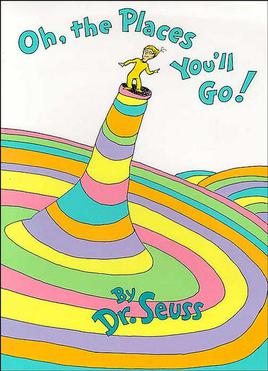Oh, the Places You'll Go! facts for kids

Cover image
|
|
| Author | Dr. Seuss |
|---|---|
| Country | United States |
| Language | English |
| Genre | Children's literature |
| Publisher | Random House |
|
Publication date
|
January 22, 1990 |
| Media type | Print (Hardcover and paperback) |
| ISBN | 0-679-80527-3 |
| OCLC | 20169007 |
| [E] 20 | |
| LC Class | PZ8.3.G276 Og 1990 |
| Preceded by | I Am Not Going to Get Up Today! |
| Followed by | Daisy-Head Mayzie |
Oh, the Places You'll Go! is a book written and illustrated by children's author Dr. Seuss. It was first published by Random House on January 22, 1990. It was his last book to be published during his lifetime. The book concerns the journey of life and its challenges.
Though written in the style of classics such as Green Eggs and Ham and The Cat in the Hat, Oh, the Places You’ll Go! has many specific characters, including a narrator and "the reader". A young boy, referred to simply as "you", initiates the action of the story; the presence of a main character helps readers to identify with the book. Unlike other Dr. Seuss books, it is written in the second person and uses the future tense.
Plot
The story begins with the narrator, relating the decision of the unnamed protagonist (who represents the reader) to leave town. The protagonist travels through several geometrical and polychromatic landscapes and places, eventually encountering a place simply called "The Waiting Place", which is ominously addressed as being a place where everyone is always waiting for something to happen. As the protagonist continues to explore, spurred on by the thoughts of places he will visit and things he will discover, the book cheerfully concludes with an open ending.
Film adaptation
In the early 1990s, producers Ben Myron & Roland Joffé, at Lightmotive with TriStar Pictures, were set to produce a film adaptation of the book with Seuss penning the screenplay. The Seuss screenplay was later rewritten by Richard LaGravenese and Barry Berman respectively, but the adaptation was never filmed. A musical animated film adaptation of the book along with The Cat in the Hat and a spin-off Thing One and Thing Two are in development from Warner Animation Group. J. J. Abrams is producing the film alongside his production company Bad Robot Productions.
Legal issues
In 2016, former Star Trek writer David Gerrold partnered with artist Ty Templeton and Glenn Hauman's website ComicMix for a Kickstarter for a parodic book entitled Oh, the Places You'll Boldly Go! The proposed book would parody the original Seuss book in a Star Trek context. (The title references the phrase "to boldly go where no one has gone before", made famous by Star Trek.)
Dr. Seuss Enterprises, which manages the assets of Dr. Seuss's estate, sued to stop the Kickstarter. The lawsuit stated that Hauman's book, which, also makes use of other of Seuss' books, including Oh, The Places You'll Go!, Horton Hears a Who, How the Grinch Stole Christmas!, The Lorax, and The Sneetches and Other Stories, copied Dr. Seuss' copyrighted work, recreating entire pages from his books "with meticulous precision." The lawsuit also stated that the book's violation of Dr. Seuss' trademark would create confusion in the minds of the public as to Dr. Seuss's approval or licensing.
In May 2018, U.S District Court Judge Janis Sammartino found in favor of ComicMix on the issue of Dr. Seuss' trademark, ruling that its book was "a highly transformative work that takes no more than necessary to accomplish its transformative purpose and will not impinge on the original market for Plaintiff's underlying work."
In March 2019, Sammartino similarly found in favor of ComicMix on the issue of copyright, ruling that the book was protected under Fair Use, because its authors borrowed "no more than was necessary for their purposes," and those elements "were always adapted or transformed," and "imbued with a different character."
The Ninth Circuit Court of Appeals reversed that decision in December 2020 on the basis that the work was not parody as it copied too much of the book's original style and composition, only juxtaposing Star Trek characters in place of Seuss' original ones. Further, the Ninth Circuit argued that the timing of release might impact the commercial value of Seuss' book, since the latter is often given out as gifts for graduates.

